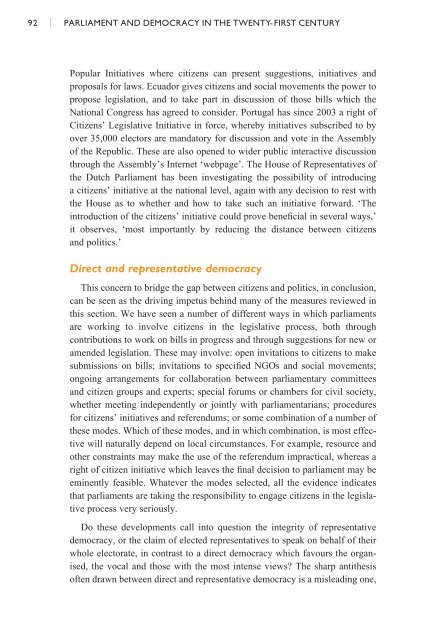PARLIAMENT AND DEMOCRACY - Inter-Parliamentary Union
PARLIAMENT AND DEMOCRACY - Inter-Parliamentary Union
PARLIAMENT AND DEMOCRACY - Inter-Parliamentary Union
You also want an ePaper? Increase the reach of your titles
YUMPU automatically turns print PDFs into web optimized ePapers that Google loves.
92 I <strong>PARLIAMENT</strong> <strong>AND</strong> <strong>DEMOCRACY</strong> IN THE TWENTY-FIRST CENTURY<br />
Popular Initiatives where citizens can present suggestions, initiatives and<br />
proposals for laws. Ecuador gives citizens and social movements the power to<br />
propose legislation, and to take part in discussion of those bills which the<br />
National Congress has agreed to consider. Portugal has since 2003 a right of<br />
Citizens’ Legislative Initiative in force, whereby initiatives subscribed to by<br />
over 35,000 electors are mandatory for discussion and vote in the Assembly<br />
of the Republic. These are also opened to wider public interactive discussion<br />
through the Assembly’s <strong>Inter</strong>net ‘webpage’. The House of Representatives of<br />
the Dutch Parliament has been investigating the possibility of introducing<br />
a citizens’ initiative at the national level, again with any decision to rest with<br />
the House as to whether and how to take such an initiative forward. ‘The<br />
introduction of the citizens’ initiative could prove beneficial in several ways,’<br />
it observes, ‘most importantly by reducing the distance between citizens<br />
and politics.’<br />
Direct and representative democracy<br />
This concern to bridge the gap between citizens and politics, in conclusion,<br />
can be seen as the driving impetus behind many of the measures reviewed in<br />
this section. We have seen a number of different ways in which parliaments<br />
are working to involve citizens in the legislative process, both through<br />
contributions to work on bills in progress and through suggestions for new or<br />
amended legislation. These may involve: open invitations to citizens to make<br />
submissions on bills; invitations to specified NGOs and social movements;<br />
ongoing arrangements for collaboration between parliamentary committees<br />
and citizen groups and experts; special forums or chambers for civil society,<br />
whether meeting independently or jointly with parliamentarians; procedures<br />
for citizens’ initiatives and referendums; or some combination of a number of<br />
these modes. Which of these modes, and in which combination, is most effective<br />
will naturally depend on local circumstances. For example, resource and<br />
other constraints may make the use of the referendum impractical, whereas a<br />
right of citizen initiative which leaves the final decision to parliament may be<br />
eminently feasible. Whatever the modes selected, all the evidence indicates<br />
that parliaments are taking the responsibility to engage citizens in the legislative<br />
process very seriously.<br />
Do these developments call into question the integrity of representative<br />
democracy, or the claim of elected representatives to speak on behalf of their<br />
whole electorate, in contrast to a direct democracy which favours the organised,<br />
the vocal and those with the most intense views? The sharp antithesis<br />
often drawn between direct and representative democracy is a misleading one,

















